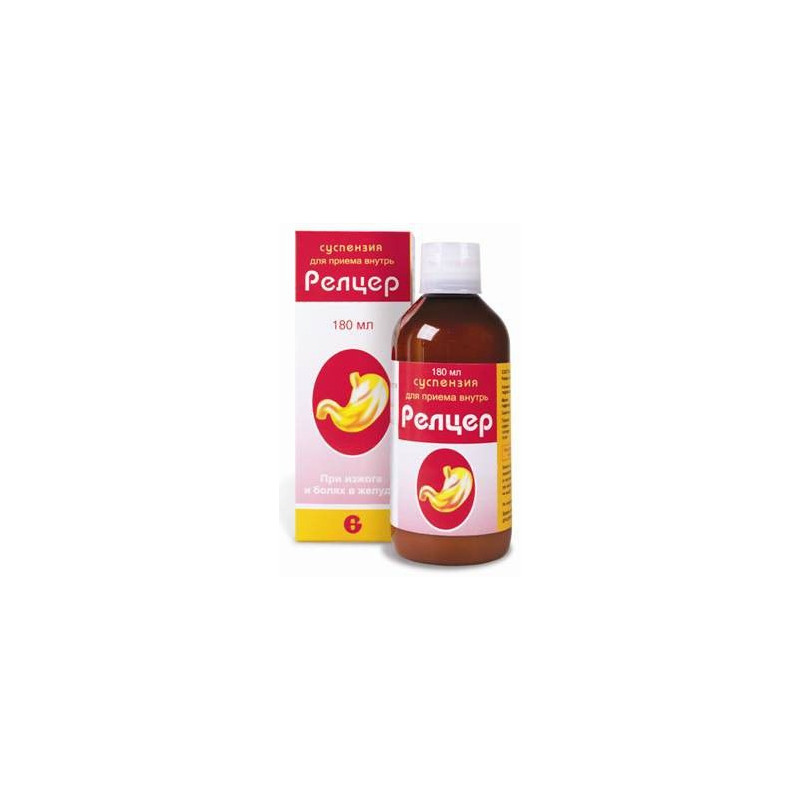



 All payments are encrypted via SSL
All payments are encrypted via SSL
 Full Refund if you haven't received your order
Full Refund if you haven't received your order
180 ml
RELTSER - antacid, carminative. Neutralizes free hydrochloric acid in the stomach, which leads to a decrease in the digestive activity of gastric juice. Does not cause secondary hypersecretion of gastric juice. It has an adsorbing and enveloping effect, reduces the influence of damaging factors on the gastric mucosa. Accelerates the healing of gastric and duodenal ulcers. Reduces flatulence in the intestines.
Peptic ulcer and duodenal ulcer in the acute phase. Acute gastritis, chronic gastritis with increased and normal secretory function in the acute phase, duodenitis.
Hernia of the esophageal opening of the diaphragm, reflux esophagitis.
Discomfort and pain in the epigastrium with errors in diet, after taking medication, drinking coffee, nicotine, alcohol.
Hypersensitivity to the components of the drug, fructose intolerance, hypophosphatemia, marked impaired renal function, Alzheimer's disease, pregnancy, breastfeeding period, children under 10 years of age.
Contraindicated in pregnancy. At the time of treatment should stop breastfeeding.
Inside, after 1 h after a meal and in the evening before bedtime or when discomfort, epigastric pain, heartburn occurs. Before taking the suspension must be homogenized by shaking the bottle.
Adults and children over 15 years old - 1–2 teaspoons 3-4 times a day. The maximum daily dose is 8 teaspoons. Children from 10 to 15 years prescribed half the recommended dose for adults. The duration of treatment without medical supervision should not exceed 14 days.
Constipation, nausea, vomiting, stomach cramps, change in taste, hypermagnemia, hypophosphatemia, hypocalcemia, hypercalciuria, osteomalacia, osteoporosis, hyperaluminemia, encephalopathy, nephrocalcinosis, impaired kidney function, allergic reactions. In patients with concomitant renal insufficiency - thirst, lowering blood pressure, hyporeflexia.
It can adsorb some drugs, thus reducing their absorption. Reduces exposure to Digoxin, Indomethacin, salicylate, chloropromine pivampicillin, rifampicin, indirect anticoagulants, barbiturates, fexofenadine, Dipyridamole, zalcitabine, bile acids - chenodeoxycholic and ursodeoxycholic, penicillamine, iron and lithium preparations, quinidine, Lansoprazole, mexiletine, Ketoconazole.
When taken simultaneously with drugs in enteric-soluble dosage forms, the increased alkalinity of the gastric juice can lead to accelerated disruption of the membrane and irritation of the stomach and duodenum.
m-holinoblokatory, slowing gastric emptying, increase and prolong the effect of the drug.
Symptoms: with prolonged high doses, the formation of kidney stones, constipation, drowsiness, hypermagnesia. Signs of metabolic alkalosis can also be observed: mood changes, numbness or muscle pain, nervousness and fatigue, unpleasant taste sensations.
Treatment: it is necessary to take measures for the rapid removal of the drug: flush the stomach, induce vomiting, take activated charcoal.
In dry, the dark place at a temperature of no higher than 25 ° C
Relcer